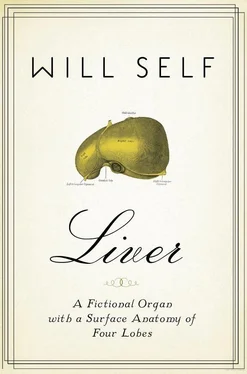‘But, Mum — ’
‘I also told you, Isobel, that I’m fed up to the back-bloody-teeth with carrying you, girl.’ From ancestral workshops came the bash and whine of her long-gone Black Country accent. ‘If you’re going to hang about on street-bloody-corners with this — this riff-raff, you can keep out of my road.’
‘I’m worried about you, Mum.’
‘Worry about yourself.’
‘What about the house? What’re you gonna do about that?’
Red and wet — was that how Isobel’s cheeks were always going to be? Unreasonably — because she knew this was only the lost girl’s compounded neurosis, no home to go to at chucking-out time — Joyce grew still angrier with her grasping, ungrateful, sot of a daughter.
‘The house, the house — that’s all you ever think about, Isobel. Worried you won’t be getting your money any time soon, are you? Honestly, if your father could see you now!’ If he could, he’d give her a hug, stroke her stupid dyed hair. Comfort her .
Isobel was now sobbing; Swiss travellers hurried past, eyes averted, heading for the ticket machines. Joyce got a pen and notebook out of her handbag, and, distraught as she was, Isobel still noticed this new acquisition. Joyce scrawled Vreni Stauben’s address and phone number on a page, tore it out and handed it to her daughter.
‘This is where I’m staying, if you feel you have to reach me. I don’t want to know where you are, Isobel, not until you straighten yourself out.’
‘But, Mum, I’ve got no. You see, my credit card — ’
Joyce forestalled this bloody beggary , so at odds with the nation, its cavernous Alps stuffed with hard cash . She got out her wallet and slapped five rust-coloured notes into her daughter’s hand; then she tried to walk away, briskly, without a backward glance, deliver them from the lion’s mouth , but Isobel was still quicker.
The drunk woman grappled at Joyce’s arm, and it took fifty or a hundred yards to shake her off. She fell back to the group by the statue, and the last her mother saw of her, when she did look, was Isobel being comforted by the Tamil man, who had put down his beer and clasped her in an embrace that — since he was a full head shorter — appeared bloody ridiculous .
Joyce used her own key to the apartment, and walked straight down the corridor and into the main room. Ueli Weiss and Marianne Kreutzer were on one of the sofa-slabs; Vreni Stauben sat quivering on a chair. The dusty curtains had been opened and the blinds rolled up; there was a figure at the window, and, when it pivoted to confront Joyce, it took a while for her to establish its sex.
Then he said, ‘Mrs Beddoes — Joyce, if I may?’ in flawless English, while advancing to take her hand. ‘This is an intrusion — and an unexpected one for you — so, you must please forgive us?’
Is he wearing fancy dress? But no , it was a purple-trimmed soutane with wide, flaring skirts; a vivid purple sash cut across his tubular upper body; and a black biretta with a purple tuft was set on top of his head — the capital of this human column.
‘I am Monsignor Reiter,’ the priest announced — not without a trace of pride — ‘but please, call me Jean.’
Joyce noticed the gold band on his wedding finger, and a white gold signet ring set with diamonds on his little one. He was young, this priest, and so white-skinned that he looked as if the pigment had been sucked out of him. He was also very tall, with a long El Greco face and black glossy hair so dense that even though he must have shaved that morning — evidenced by the fresh nick on his sharp Adam’s apple — his hollow cheeks were already blue-shadowed by new stubble.
‘How do you do,’ Joyce conceded.
Vreni began flapping, asking Joyce if she wanted tea. coffee. Even Marianne, who was in an eau-de-Nil silk top that must have cost a small fortune , seemed a little awed by the prelate.
‘Why,’ Joyce asked him, ‘are you here?’
‘I am a papal chaplain,’ Reiter explained, ‘charged by the Curia with the task of assessing certain kinds of. well, perhaps the least prejudicial way of putting it would be to call them ‘‘unusual events’’.’ He raised his eyebrows; it was a radical move that made of his face something comical and expressive; temporarily, he appeared dumbfounded by his own words, overawed by his own magnificence.
They were still standing. Joyce paced herself. She slowly unbuttoned her coat, retreated to the vestibule to hang it up — together with the woollen tam she had bought at Day’s — then, returning to the living room, she sat down on the least comfortable of Vreni Stauben’s chairs: an aluminium frame with a leather sling for a seat. She didn’t feel particularly intimidated by the situation — priests, doctors, where was the difference? She had dealt with such professionals all her working life, and, as Derry had been a solicitor, she had also socialized with lawyers.
Joyce let her gaze track from one Swiss to the next. Vreni Stauben was cowed. ‘Ueli — Herr Weiss,’ she said, wheezing self-exculpation, ‘he has been making calls all the days to say how is Frau Beddoes?’
‘And you told him I was. fine?’
‘You did not seem like the cancer patient to me, Joyce.’ She allowed herself the upturned palms of a martyr.
Weiss held the tip of one finger up to his walrus moustache. ‘When we first met, outside the chapel, I saw a very sick woman.’ A second finger poked at the charged atmosphere. ‘But when you came to St Anton’s you were much better.’ Weiss, Joyce thought, had the professional manner of someone who had no defined profession. ‘I could tell, because I had already seen how sick you were. Und now, well, Frau Beddoes’ — he withdrew the finger, laughed curtly — ‘these big walks round the town, and — you must forgive her — but Frau Stauben, yes, she has been telling me with what — der Appetit ?’
‘With what relish,’ said the Papal Chaplain, relishing the opportunity to correct his countryman’s English.
‘So, yes, exactly: with what relish you have been eating her R  schti . Und now, we see here a very sprightly, yes? Sprightly lady. Well, already when I was talking with Father Grappelli about you — and you saying what had happened with Hohl — I am thinking this is not usual, it is strange happening. So, well, we are being very careful — Grappelli, he is frightened, but I say we must — ’
schti . Und now, we see here a very sprightly, yes? Sprightly lady. Well, already when I was talking with Father Grappelli about you — and you saying what had happened with Hohl — I am thinking this is not usual, it is strange happening. So, well, we are being very careful — Grappelli, he is frightened, but I say we must — ’
Leaning forward, Joyce cut Weiss off with a wave of her hand. ‘Can I be right in what I’m hearing, Herr Weiss?’ She was as matter-of-fact as if she had been querying bed allocation or late laundry delivery. ‘Are you suggesting that what has happened to me is a’ — she grimaced — ‘miracle?’
Joyce wasn’t at all surprised that Vreni Stauben crossed herself, but a little that Marianne Kreutzer did so as well.
‘Aha!’ Reiter interjected. ‘This term — we don’t use it so much nowadays; it is very value-laden, I think. The preferred expression — certainly during preliminary inquiries — is ‘‘perceived suspension of natural law’’.’
Joyce laughed at his bureacratic jargon of the supernatural; laughed with Falstaffian vigour. ‘Gentlemen — ladies,’ she said once her merriment had subsided, ‘I can’t deny that I’m feeling extremely well indeed — and I’m happy to discuss the possible reasons for this, but, before we go any further, two things: I think I heard the kettle boil, Vreni. I’m thirsty and I would like some tea.’ Frau Stauben got up and, after soliciting the others’ orders for hot drinks, clucked off to the kitchen. ‘Second,’ Joyce resumed, ‘if I have been the. subject? Of a suspension in natural law, could you tell me, please, who has been doing the suspending?’
Читать дальше

 schti . Und now, we see here a very sprightly, yes? Sprightly lady. Well, already when I was talking with Father Grappelli about you — and you saying what had happened with Hohl — I am thinking this is not usual, it is strange happening. So, well, we are being very careful — Grappelli, he is frightened, but I say we must — ’
schti . Und now, we see here a very sprightly, yes? Sprightly lady. Well, already when I was talking with Father Grappelli about you — and you saying what had happened with Hohl — I am thinking this is not usual, it is strange happening. So, well, we are being very careful — Grappelli, he is frightened, but I say we must — ’










